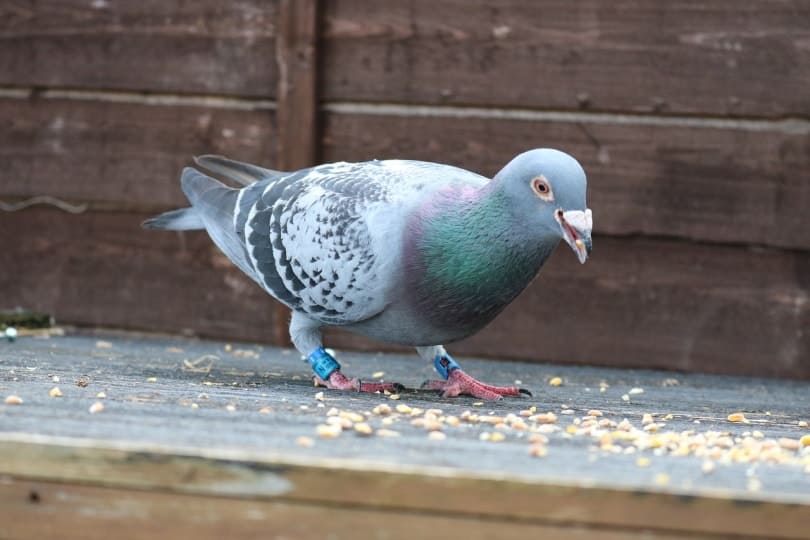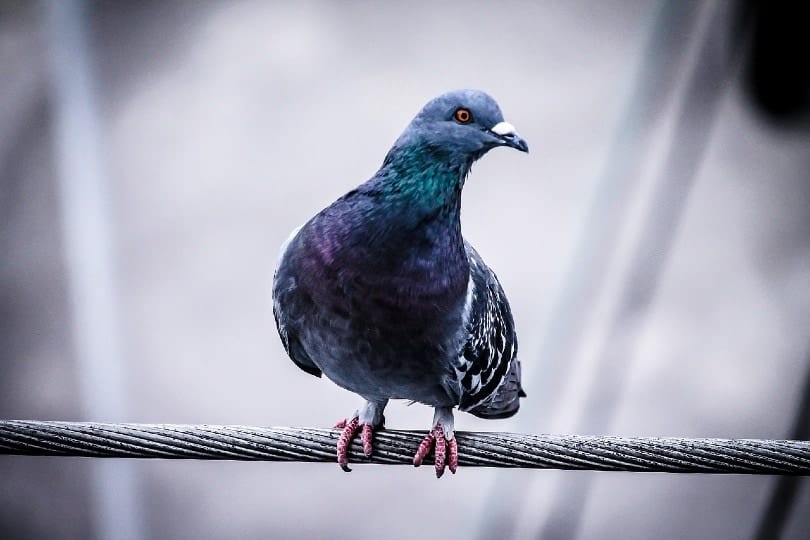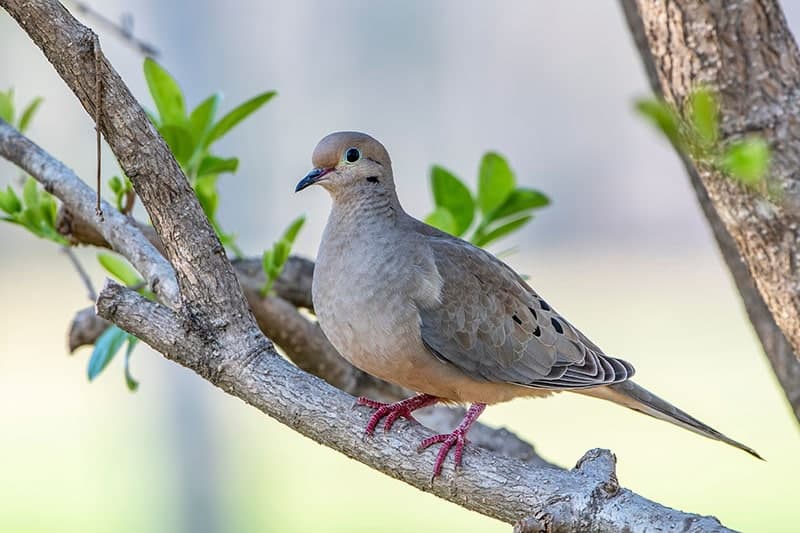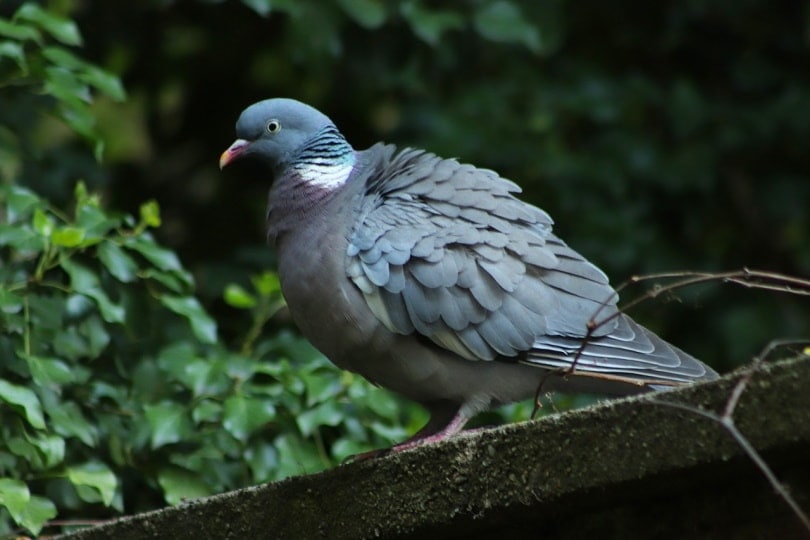There are over 300 species of pigeons and doves all over the world. They live in a wide range of different habitats, from deserts to rainforests and even urban areas. As a result, their specific diet depends somewhat on available foods in their area. They help manage insect populations in their regions, disperse seeds, and even eat unwanted weeds. If you’ve ever wondered exactly what types of food pigeons and doves eat—and how a wild bird’s diet differs from that of a bird in captivity—we have the answers for you in this article! Since they are omnivores, they eat a variety of foods in the wild, such as berries, insects, seeds, and others, however, as pets, they eat mostly pelleted food. Keep reading to learn about what doves and pigeons eat and the important vitamins and minerals they need to stay healthy.

What Do Wild Pigeons and Doves Eat?
Pigeons and doves are both omnivores. In the wild, they eat a variety of foods including berries and other fruits, seeds, greens, grains, worms, snails, and insects. As we mentioned, a wild pigeon or dove’s dinner menu will vary a lot based on where they are located, the season, and other important aspects that impact diet.
When they are not hunting for their own food, they are trying not to become a meal themselves. Doves and pigeons are preyed upon by larger birds such as sparrowhawks and falcons, as well as foxes, rats, snakes, and the occasional domestic cat or dog.

What Should You Feed Pet Pigeons and Doves?
The diet of a pet bird tends to look pretty different from that of a wild bird. This is because it’s harder for a bird in captivity to get the same variety in their diet as they would have in the wild. Thankfully, you can purchase pelleted food for your pet pigeon or dove that will help provide all of its nutritional needs. Look for foods specially formulated for pigeons and doves.
Of course, birds love snacks, and there are many different nutritious snacks you can offer your bird to help supplement the pelleted diet. In the next section, we will discuss vitamins and minerals that are crucial to your bird’s diet and snacks you can offer to help them get these vitamins.

What Vitamins and Minerals Do Pigeons and Doves Need?
Formulated pellets for pigeons and doves will provide the essential vitamins they need. However, they do not absorb all of the vitamins they eat, so it is not a bad idea to provide your birds with snacks that add nutritional value to your bird’s diet. Below we have listed the vitamins and minerals that are essential for pigeons and doves to have a nutritionally balanced diet.
1. Vitamin A
Vitamin A plays an important role in helping your bird develop healthy skin and feathers. Birds who eat exclusively seeds are at risk of having a vitamin A deficiency. Healthy snacks that contain vitamin A include orange vegetables such as sweet potatoes and carrots and leafy greens such as broccoli and collards.
2. Vitamin B Complex
The vitamin B complex includes several different vitamins including thiamine (B1), riboflavin (B2), niacin (B3), and choline (B4). These vitamins help your bird’s body function on a cellular level. It is easy for birds to develop a deficiency of B vitamins if they aren’t part of a fortified pelleted diet. Vitamin B can be found in hard-boiled eggs, fish, poultry, beans, some seeds and nuts, leafy vegetables, and some fruits such as bananas.

3. Vitamin C or Ascorbic Acid
Vitamin C helps control your bird’s metabolic functions. Snacks containing vitamin C include citrus fruits, peppers, brussels sprouts, potatoes, and strawberries.
4. Vitamin D
Just like you, pigeons and doves need vitamin D in order to properly absorb calcium. Birds who spend time outdoors may not need vitamin D supplements because they are capable of making their own vitamin D with exposure to sunlight. However, birds who live exclusively indoors will benefit from additional vitamin D in their diets. Other than fortified pellets, your bird can get vitamin D from oily fish, egg yolks, red meat, and some breakfast cereals.
5. Vitamin E
Vitamin E also helps contribute to your bird’s metabolic functions. It also serves as an antioxidant. Foods containing vitamin E include sunflower seeds, almonds, salmon, trout, red pepper, and mango.
6. Vitamin K
Vitamin K helps your bird’s blood properly coagulate. It is primarily found in vegetables such as kale, spinach, brussels sprouts, turnip greens, mustard greens, broccoli, cabbage, and cauliflower.


How To Attract Wild Pigeons and Doves to Your Backyard Feeder
If you don’t have a pet bird but enjoy watching wild doves and pigeons in your backyard, you might consider setting up a bird feeder. You can put a mix of corn, seeds, wheat, and millet in the feeder; doves and pigeons will happily graze at these foods, which will last longer than fresh fruits and vegetables. Consider that some species of dove, such as mourning doves, are relatively large. If you are trying to attract a particular bird that is fairly large, you should look for a large feeder to accommodate these birds.
In addition to a feeder, you can attract birds to your yard by setting up a shelter or nesting area. You can even provide materials for building a nest, such as twigs, that will make it convenient for birds to set up in your yard.

Final Thoughts
Pigeons and doves can be found all over the world, but their nutritional needs are more or less the same. These omnivores love to eat a wide variety of foods, so if you have a pet dove or pigeon, make sure to offer plenty of fruits, veggies, and grains as snacks in addition to the routine pellets. Not only will your bird love these snacks, but they will help make sure your pet eats a well-rounded diet!
Related Reads:
Featured Image Credit: Anette Meyer, Pixabay
